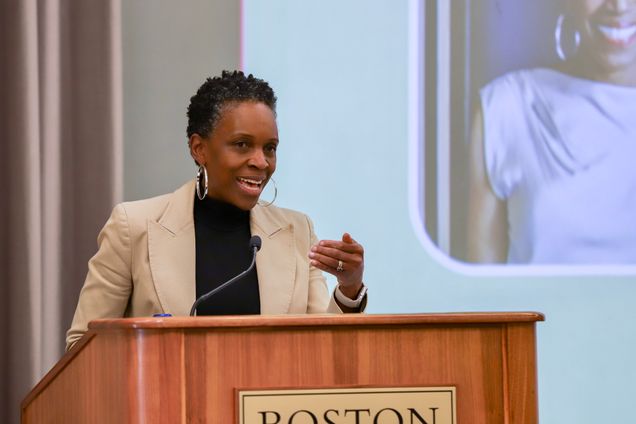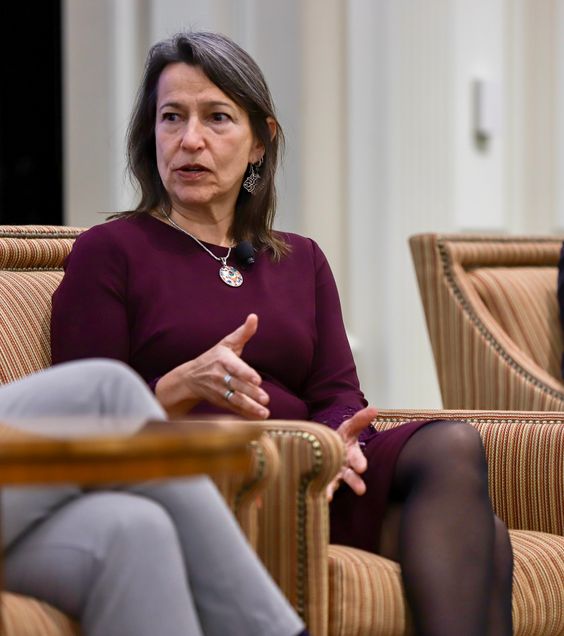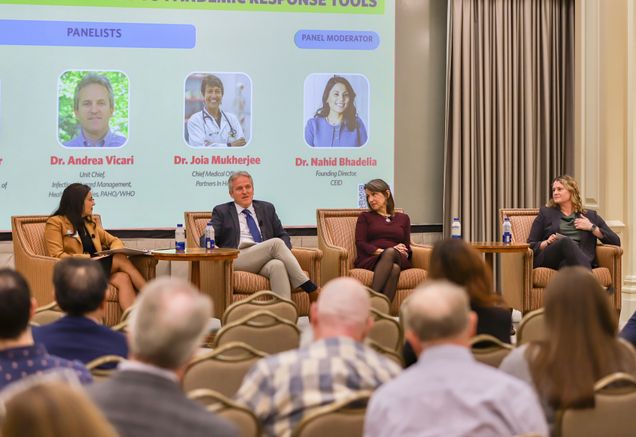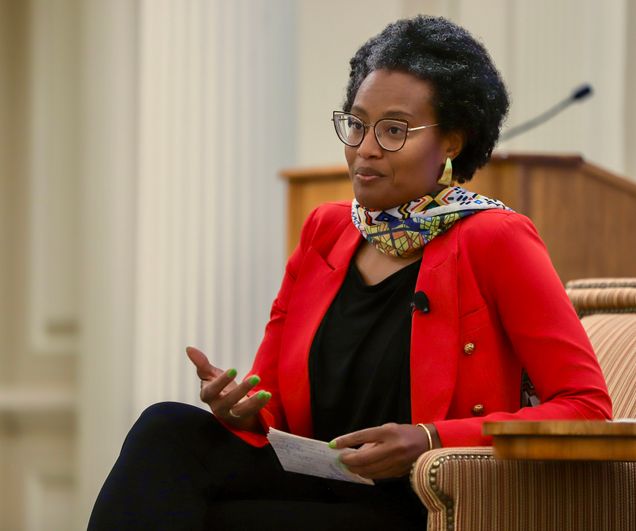Event summary: Global Equity in Access to Pandemic Response Tools – November 7, 2024
On Thursday, November 7th, 2024, the Boston University Center on Emerging Infectious Diseases (CEID) hosted “Global Equity in Access to Pandemic Response Tools,” the latest in its semiannual symposium series. The symposium opened with remarks from BU President Dr. Melissa Gilliam, followed by a panel discussion with Dr. Hillary Carter, Senior Strategist for Global Health Security, U.S. Dept. of State; Dr. Joia Mukherjee, Chief Medical Officer, Partners In Health; and Dr. Andrea Vicari, Unit Chief, Infectious Hazard Management, Health Emergencies, PAHO/WHO. The panel was moderated by Dr. Nahid Bhadelia, CEID Founding Director. A keynote address by Loyce Pace, Assistant Secretary for Global Affairs, U.S. Dept. of Health & Human Services concluded the afternoon of thoughtful conversations about the future of healthcare and global collaboration.
In her opening remarks, President Gilliam spoke about the wide-reaching effects pandemics have, rippling out to education and economy, sharing her own experience of having research and community interventions in rural India cut short by the COVID-19 pandemic. In addition to the immediate healthcare concerns, pandemics often hit low- and middle-income countries (LMICs) hardest in social and societal ways, underscoring the need for global collaboration.

In the panel discussion, speakers addressed the importance of collaboration, innovation, and community engagement in achieving global equity in pandemic preparedness and response.
Dr. Mukherjee asserted that if a response is just being set up once there is an infectious disease threat, it is already too late. The most successful responses happen where there are already systems and infrastructure already in place. She gave the example of Rwanda where the response to the AIDS epidemic spurred an investment in developing healthcare systems and infrastructure. Because of this long-range view on pandemic preparedness, when faced with the 2014 Ebola outbreak, the COVID-19 pandemic, and more recently an outbreak of Marburg virus, Rwanda has consistently had some of the most successful outcomes.

Using Rwanda’s Ministry of Health as an exemplar to replicate, she spoke about Partners in Health’s work in Sierra Leone. Rather than pulling out once the immediate threat of the COVID-19 pandemic had subsided, the organization has stayed to rehabilitate hospitals there, which were lacking basic equipment like IV fluids and blood pressure cuffs, with the goal to be better equipped for future crises.
Building up systems for healthcare also requires a workforce that is able to meet those needs. Dr. Carter spoke about the roles that nurses play in the frontlines of pandemic response. She cited the work that the U.S. President’s Emergency Plan for AIDS Relief (PEPFAR) has done in launching a nursing leadership initiative which seeks to enhance global nursing practices, both through education and protecting nurses by strengthening and increasing infection prevention and control.

Along with educating first responders, Dr. Vicari discussed the importance of communicating clearly both with decision makers and the public. He emphasized that this includes going beyond talking in soundbites and getting into thoughtful, clear conversations that provide more context and nuance.
Two days following election day in the US, the topic on many people’s minds was how political polarization, both in the US and more broadly, effects health policy and access. To argue for greater support of vulnerable communities within our own borders and across the globe, speakers agreed that to address issues as globally intertwined as infectious disease outbreaks, there must be clear communication and collaboration. To successfully mitigate global spread of infectious diseases, it would be short-sighted to rely too heavily on any one country to tackle pandemic preparedness.
In her keynote address, Assistant Secretary Pace struck an intimate, conversational tone with the audience. Amid the uncertainty of what changes in administration may hold, she remained largely hopeful, reminding the audience of the capabilities of non-governmental organizations to act outside of the limitations of government health agencies.

She explained that she views inclusion and understanding as a necessary component of improving equity. A historical over-reliance on Western, high-income countries for resources has in some ways missed hearing what the needs and concerns of LMICs are. “You can’t do anything for anyone without knowing what it is they really want and how they themselves would approach these problems,” she said. Making space for more voices to be heard is one way to ride the waves of potential changes in political priorities.
Finally, Ms. Pace ended on an optimistic note for the future. She shared that knowing there are still people who want to do this work of improving equity and access give her hope for the future of pandemic preparedness and response.
Visit CEID on YouTube for a full recording of the event.
